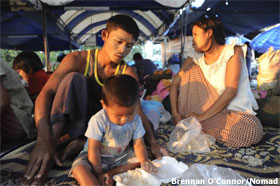Burmese opposition leaders on Friday informed US deputy assistant secretary of state for East Asia and Pacific affairs Joseph Yun that a second Panglong conference could only be fruitful if the Burmese military supported the proceedings ...
Chiang Mai (Mizzima) – Burmese opposition leaders on Friday informed US deputy assistant secretary of state for East Asia and Pacific affairs Joseph Yun that a second Panglong conference could only be fruitful if the Burmese military supported the proceedings, National League for Democracy spokesman Ohn Kyaing told Mizzima.
 “The second Panglong conference is intended to give people a strong sense of unity. It does not intend to oppose any person or any organisation. Practically, it will be fruitful only if the military participates in it. So, we want the military to participate in it. It’s an affair we need to do in unison,” Ohn Kyaing said.
“The second Panglong conference is intended to give people a strong sense of unity. It does not intend to oppose any person or any organisation. Practically, it will be fruitful only if the military participates in it. So, we want the military to participate in it. It’s an affair we need to do in unison,” Ohn Kyaing said.
The comment came on the final day of Yun’s four-day visit to Burma, as the US diplomat met NLD and Committee Representing the People’s Parliament (CRPP) representatives at NLD general secretary Aung San Suu Kyi’s home for more than an hour.
CRPP general secretary Aye Tha Aung added that he felt national reconciliation could be achieved through a second Panglong conference.
“Firstly, we need to reach a basic agreement. Then, the military needs to make some changes and give the political parties basic rights. After an all-inclusive dialogue we will achieve national reconciliation. National reconciliation is the most important thing. The second Panglong conference can achieve it,” Aye Tha Aung elaborated.
After the meeting with Yun, NLD central executive committee members and CRPP members held further deliberations. Ohn Kyaing said they discussed national reconciliation, the NLD’s right to survive as a legal party and means to obtain the freedom of political prisoners.
CRPP member Htaung Ko Thang, who attended the meetings, said Burman and ethnic people were also concerned for Suu Kyi’s personal security, seeking international community assistance in providing her security, according to the NLD spokesman.
Yun visited Burma’s administrative capital of Naypyidaw on Thursday, speaking with Burmese authorities including Foreign Minister Nyan Win, Science and Technology Minister U Thaung and Police Chief Khin Yi.
A statement issued by the US embassy in Rangoon said Washington was seeking direct talks with the junta on the subjects of human rights, political prisoners and other important issues.
Although Naypyidaw’s response to Washington’s overture was unknown, the country’s state-run newspaper, New Light of Myanmar, acknowledged that the government met the US diplomats to promote bilateral relations and co-operation.
The Panglong Agreement was reached between the Burmese government under Aung San, Suu Kyi’s father, and the Shan, Kachin and Chin peoples on February 12, 1947. Signatories accepted in principle “Full autonomy in internal administration for the Frontier Areas” and envisioned the creation of a Kachin State by the Constituent Assembly (the first post-independence parliament).
The deal came a year after the first Panglong Conference was held in the town of the same name in the south of Shan State.
U Nu, who took over the reins of Aung San’s Anti-Fascist People’s Freedom League party following the latter’s assassination in July 1947, did little to implement the Panglong compact after Burma received independence in January 1948. His failure to live up to the promise of Panglong left ethnic minorities in Burma feeling betrayed.
Since 1948, ethnic minorities have had their rights and self-determination in traditional areas of control denied, leading many of the groups to armed struggle against the ruling Burmese military junta. The junta has responded, the United Nations and human rights groups have detailed, with killings, rape, torture, forced labour and burning of villages in ethnic areas as the regime tries to deny the rebels support from the civilian population.
Thailand already shelters 250,000 ethnic minority refugees after brutal campaigns by the Burmese Army.


